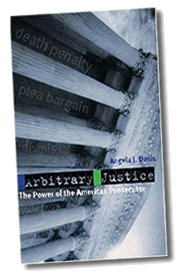

CHAPTER ONE: Prosecutorial Discretion: Power and Privilege – The introductory chapter explains what the book is about, beginning with stark examples of how the unchecked exercise of prosecutorial discretion can produce unjust results in the criminal justice system. It discusses why prosecutorial discretion is necessary and why reform of the current system is essential. READ THIS CHAPTER
CHAPTER TWO: The Power to Charge – The charging power is the most important prosecutorial responsibility. Together with the plea bargaining decision, it frequently predetermines the outcome of criminal cases. This chapter explores how the legal exercise of this power results in race and class disparities in the criminal justice system with a discussion of high profile cases and examples from the author’s experience as a public defender in the District of Columbia
CHAPTER THREE: Let’s Make a Deal: The Power of the Plea Bargain – Like the charging power, plea bargains are totally within the discretion of the prosecutor. The author explains the process and provides more examples of inequitable treatment in the process.
CHAPTER FOUR: Prosecutors and the Victims of Crime – The relationship between prosecutors and crime victims is complicated and frequently misunderstood. The author discusses the prosecutor/victim relationship and explores how race and class sometimes play a role in the treatment of crime victims.
CHAPTER FIVE: Prosecutors and the Death Penalty – No issue makes the case for restraining prosecutorial power more forcefully than the death penalty. This chapter explains the role that prosecutors play in the implementation of the death penalty with a discussion of ongoing racial disparities. It also highlights two prosecutors who have actively opposed the death penalty.
CHAPTER SIX: Federal Prosecutors and the Power of the Attorney General – This chapter demonstrates that all of the problematic issues that affect the prosecutorial function – unbridled discretion, unrestrained power, and the lack of accountability – are played out much more intensely in the hands of federal prosecutors. The role of federal prosecutors in the war on drugs and mandatory minimum sentencing is explored as well as the unrestrained power of two recent attorneys general.
CHAPTER SEVEN: Prosecutorial Misconduct: The Abuse of Power and Discretion – The author provides power evidence that prosecutorial misconduct is a fairly widespread problem with shocking examples of cases in which prosecutors withheld exculpatory information and threatened witnesses. She argues that there is a thin line between the legal exercise of prosecutorial discretion on the one hand and prosecutorial misconduct on the other.
CHAPTER EIGHT: Prosecutorial Ethics – This chapter demonstrates that neither the current rules of professional responsibility nor the disciplinary process for lawyers adequately address the prosecution function.
CHAPTER NINE: Prosecutorial Accountability – The author denounces the current mechanisms of prosecutorial accountability as totally inadequate and explores the effect of the media on prosecutorial accountability.
CHAPTER TEN: Prospects for Reform – In this chapter, the author offers proposals for reform that involve prosecutors, the bar, and the general public.
site created by chinus productions
